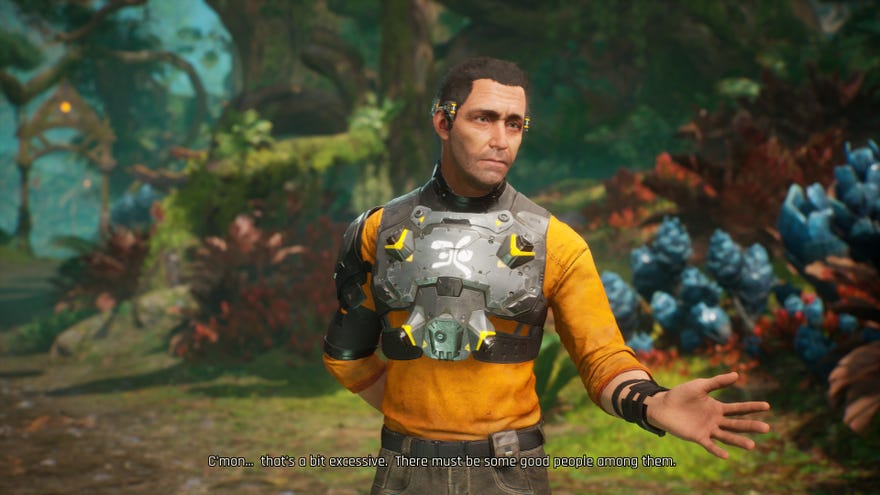Outcast: A New Beginning review: an open world dead end
Cutter down
Cast your eye over the original Outcast from 1999 today, and you'll find a world that's more abstract than alien. Hazy, almost block colour textures are stretched to breaking point over terrain that looks like it's been pulled and poked by a child sculpting in putty slime, while its cast of beige, three-fingered Talans are so rigid that they'd all be reigning champions at the local robot dance-off. Understandable, given the era in which is was made, but even so - what a difference 25 years make. Even after 2017's remake glow-up with Outcast: Second Contact, A New Beginning's version of Adelpha is a lush and verdant paradise, with treetops soaring over your head, and mountains requiring several triple or quadruple jetpack jumps to traverse. It's no Avatar: Frontiers Of Pandora, admittedly, but it leans in very much the same direction, punching your eyeballs with such bright, primary colours that you'll feel enticed to explore every inch of it.
A shame, then, that all its visual splendour amounts to is little more than an empty husk filled with open world busy work that already felt tired and done ten years ago. Its non-linear approach to storytelling remains intact, letting you tackle the quests and problems of its numerous village settlements in any order you wish, but even this has been boiled down to tedious checklists of fetch quests, escort missions and shooting up the same identikit facility one after another. Topping off this fatal combo is returning protagonist Cutter Slade, whose macho army dude dial is still set firmly to cringey wise-cracking and patronising stereotypes. A new beginning this ain't.
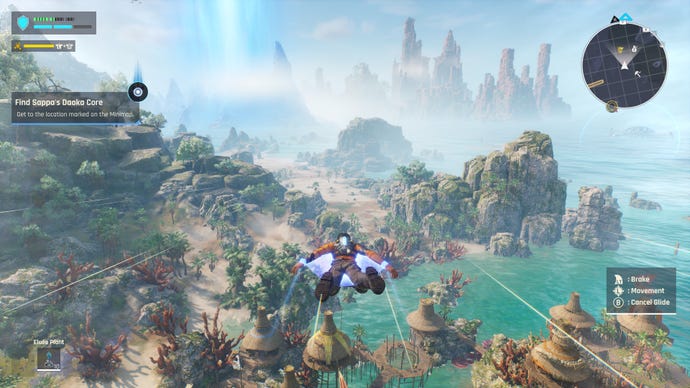
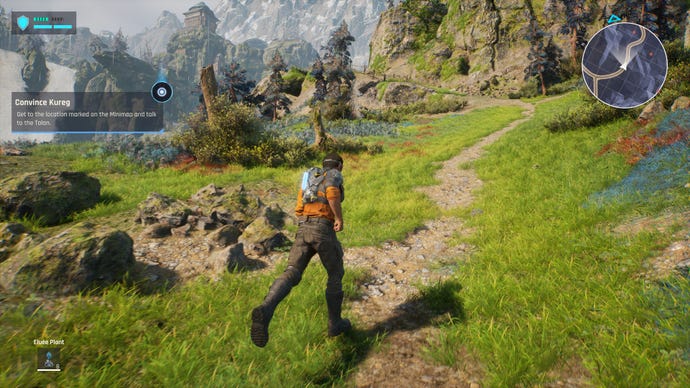
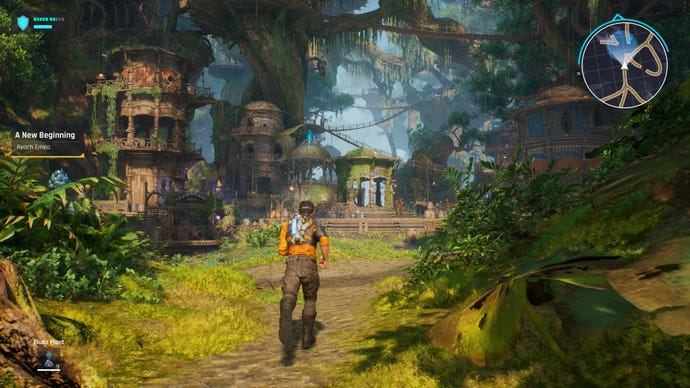
Despite dropping the 2 from its name in an attempt to draw in newcomers, this is still very much a direct sequel to the original, with the plot immediately assuming you know what a Talan is and why Cutter Slade thinks he's a big deal around these parts. The result is off-putting and abrasive, though in all honesty, everyone is such a bad hang in this game that it's hard to care about what anyone's got going on here, let alone Slade or the Talan he's trying to save from extinction. As it turns out, humans are the ones oppressing the aliens this time (that old chestnut), and shock horror, they're mostly all terrible. You don't ever feel too bad about turning their largely robot army into piles of scrap metal, though, as the main villain of the piece - a bald and pasty army general who at one point utters the exact line, "If we can't teach you English, what good are you?" to a captured Talan - is such a broad and cartoonish caricature of an ignorant colonial boomer that you actively want to wipe every last smug wrinkle off his face with the business end of your laser rifle.
He's such a colossal turd, in fact, that it makes one of the two primary objectives you're working toward here feel utterly redundant, as your main goals are to both set the stage for a once-in-a-lifetime sex orgy for the Talans (so they can secure the lineage of their race and not get instantly wiped out the moment you stop paying attention to them), while also strengthening the defences of their main village stronghold. The latter I understand, but mates, this is not the time for peace and love and babies. There are more important matters at hand, like bursting boomer boy's spaceship like a balloon.
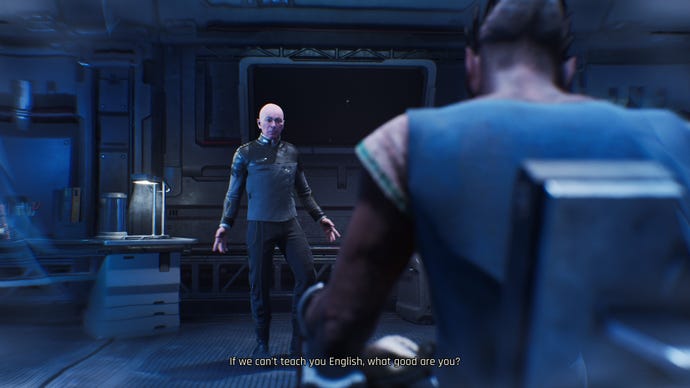
Like Avatar, many of the tasks required to complete this pair of overarching objectives feels very much like white saviour hand-wringing, with Slade becoming an unstoppable one-man army hell-bent on stepping in to fix every last problem he comes across, usually by shooting everything within a ten-mile radius. Occasionally he'll indulge in some light-hearted, if mildly janky yak herding, escorting animals from one village to another (though not without murdering incoming predators looking to get a fresh slice of dinobird drumstick), and gathering special feathers/flowers/other miscellaneous items (while also often murdering anything standing in his way), but the more villages you begin to help, the more these tedious variations on a theme start to repeat themselves. Instead of delivering animals, you're tempting giant insects down from the mountains; instead of herding yaks, you're stunning sea creatures by chasing after and then jetpacking over them.
They're all familiar reskins of quests you've completed a million times before, though the way your quest log funnels them all into one another does at least give the impression that they do all serve some wider purpose. It also does a reasonably good job of always putting more villages in your way to keep your quest log well-fed, and there were brief moments of satisfaction to be gained from seeing how some of them loop back into one another further down the line.
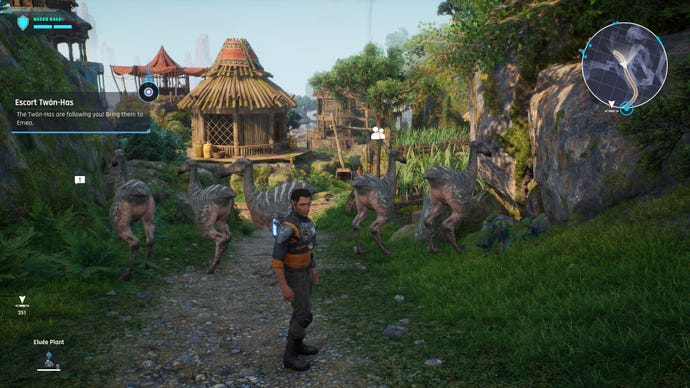
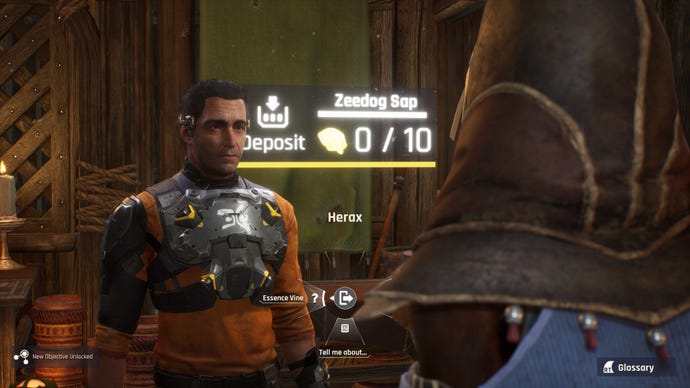
Thing is, while its menus have a whiff of management game about them, the whole system is so beholden to ticking boxes in a specific order that it becomes nothing more than a big, inter-connected checklist of tasks to complete. This is not a game about spinning multiple different plates in multiple different villages, and even quests that ask you to stockpile certain resources seemingly never need topping up once they've been deposited. Once each quest was complete, I didn't have to think about it ever again, and it's wholly lacking that sense of permanence and evolution that makes other RPG sprawls feel so alive with opportunity.
It doesnt help that its moment-to-moment box-ticking is made infinitely worse by the laboriously overstuffed conversations you have to endure with each respective quest-giver, and you'll be mashing that skip button as soon as you clap eyes on it. The dialogue is merely a means to an end in A New Beginning, as it has no bearing on your relationship with the Talan, nor does it convey any meaningful information (flavour or otherwise) beyond what gets parped out at the end of it in your quest objective.
This might have been different had Appeal Studios not seemingly binned the much-touted language system they talked about during the run-up to the game's launch. As I understood it, this would have seen Slade gradually learn the Talan's native language as he spent more time with them, strengthening his bond to individual communities along the way. In reality, however, Slade is hit with a mind-opening light beam within the first hour, after which he can converse fluently with everyone for the rest of the game. It's disappointing, to say the least, though given how much of the dialogue made me wince, it's probably for the best that we didn't end up excavating it word by word.
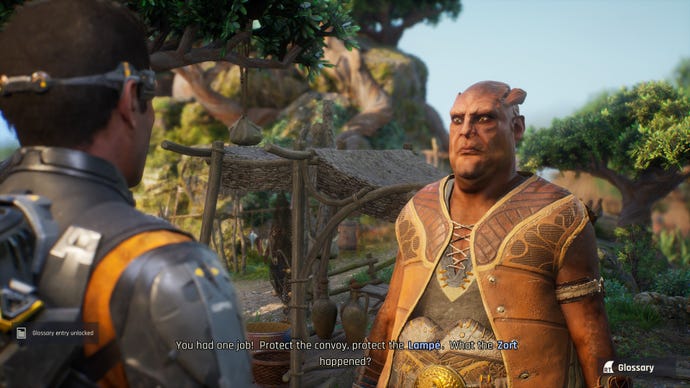
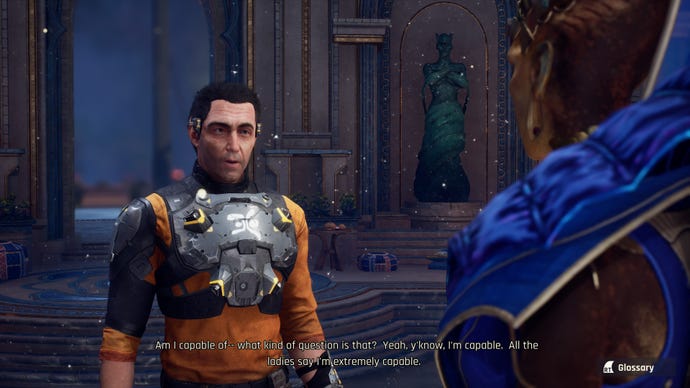
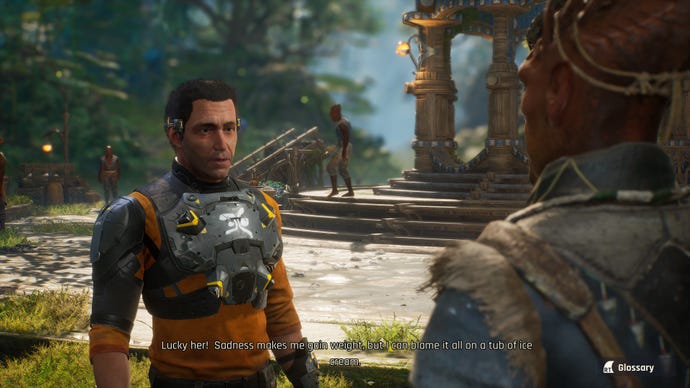
Combat, too, feels trivially easy, making even Outcast's more action-packed encounters and facility takedowns feel leaden and tepid - and that's before you realise they're all constructed from the same clutch of identical corridor templates in slightly remixed configurations. The third-person shooting is serviceable, but Slade's choice of laser pistol and rifle both lack any sense of heft or impact when pulling the trigger, and your enemies are all such dullards that you can pick them all off from a distance without barely stepping foot in the place. Indeed, if you find yourself engaging with its also quite lacklustre melee punch-ups, something's gone wrong, especially when the game's idea of upping the difficulty is to simply throw more of everything at you at once.
Alas, managing its growing crowds is equally monotonous. Slade only know how to go on the offensive in A New Beginning, which means battles simply descend into drawn-out stand-offs where you're taking potshots while darting in and out of doorways to stay just outside your prey's patrol zone. There are upgrades and modules and extra gubbins to collect to make your guns more powerful, but I rarely felt the need to actually make use of them. These robots are that much of a pushover.
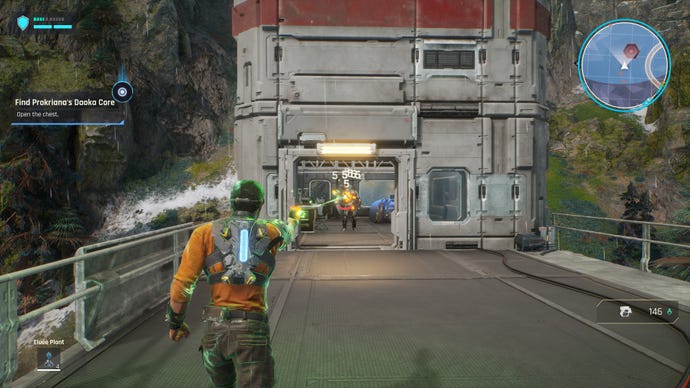
Really, though, it's Outcast's vision of what a modern day, non-linear open world Adelpha could look like that's so disappointing here. While the original was one of the more experimental and revolutionary games of its day, A New Beginning feels like the leftovers from Ubisoft's cutting room floor. If you're not activating fast-travel points, you're bombarded by glowing orbs leading you to special upgrade-point-puking plants, parkour challenges in temples to boost your health bar, and destroying ominous red spore outbreaks to extend the time of your entirely useless slow-mo power. And, of course, there are those numerous aforementioned outposts, convoys and drones to take down.
Sure, it manages to eschew the old waypoint towers, but as you push back the fog of war by simply traipsing from one end of the island to the other, the end result is still the same barrage of icons to clear out. Everything else is barren in between, giving little impetus to stray from the beaten path. You can jetpack past the more vicious local wildlife (who serve no benefit other than to savage your health bar between fetch quests), and while you may occasionally want to stop to top up your ammo by punching the corresponding coloured-rock, or scavenge a healing plant (assuming the game recognises the button prompt, which it rarely did while I was in motion), there's rarely any need to do so when the robots you're blowing up are so generous with their item drops.
Ultimately, it just makes Outcast: A New Beginning feel very tired and generic - an open world that might have impressed a decade ago, but now comes across as a game both out of time and out of favour. A small word on the game's performance, too, before I close, which (politely) runs like arse. Aside from frequent stutters when moving to new areas at speed, there were also moments where the frame rate had a full-on meltdown, descending into a farcical slideshow. Publishers THQ Nordic have assured me that optimisation patches are incoming for launch day, but oof, the review build was not a pretty sight at times, lemme tell ya. Even without these performance issues, though, Outcast: A New Beginning has bigger, more fundamental problems lying at its heart. It may finally look like the Adelpha you dreamed about 25 years ago, but this weary sequel has never felt more alienating.
This review was based on a review build of the game provided by publishers THQ Nordic.
